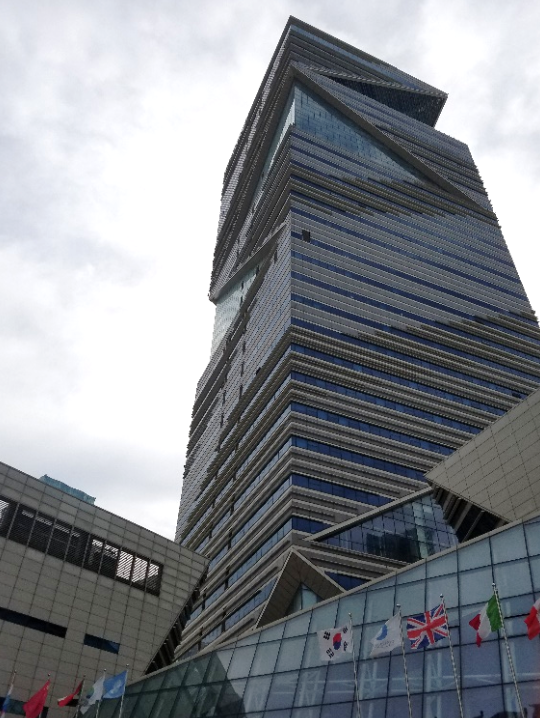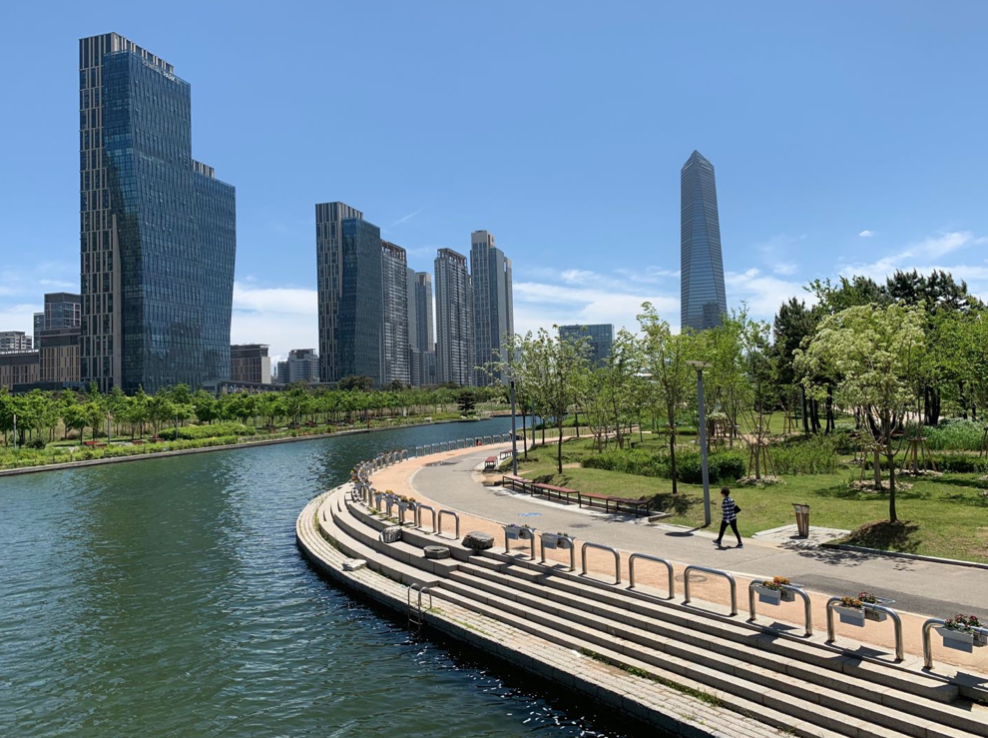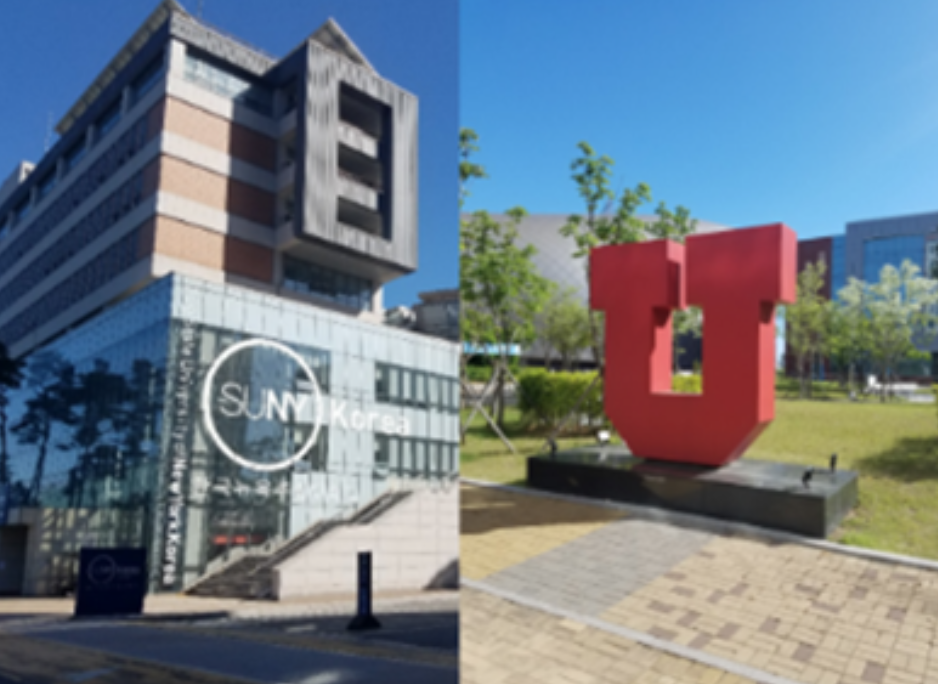Songdo: The World’s Smartest City?
June 8, 2019
A Brief Analysis of Songdo’s Progress as a Smart City
“It feels like I’m looking into the future”, was just one of the comments I overheard as we stared from the top of the G-Tower’s observatory, out into Songdo’s skyline. While we were not literally in the future, Songdo’s impressive city design had the impact to leave you speechless. Once a mudflat on the edge of the Yellow Sea, Songdo developed rapidly and turned its foundation of reclaimed land into a smart city, giving it the reputation as being the “Smartest City in the World”. The idea behind a smart city is that it can use real-time data to improve the livability and sustainability of the city. Songdo certainly delivers in that facet. Located within the Central Business District is the G-Tower, the control center for the city. Using an extensive network of CCTV cameras, the G-Tower has the ability to monitor the cities’ traffic system, gauge building temperatures, dispatch emergency response based on the situation and much more. We were all amazed as the curtains rose and revealed the war room that was the Smart City Briefing Room.
As impressive as the briefing room and the components of the smart city was, it was not Songdo’s claim to fame. Instead, the employees of the G-Tower boasted about Songdo’s existence as a part of the Incheon Free Economic Zone (IFEZ), a futuristic and self-sustaining global business frontier that is occupied by Yeongjong, Cheongna and Songdo. Three elements that contribute to the success of IFEZ are its role as global center, a hub for leisure and culture, and a home to many universities. Our tour of the city strategically covered each of these areas so we could understand the development of the IFEZ. By setting the stage for an abundance of global interactions that encourage innovation and creativity, IFEZ hopes to help South Korea emerge as a world leader.
Songdo’s spatial geography and infrastructure allows it be the strong global center that the IFEZ desires. Songdo is in close proximity to Incheon International Airport as well as a future port that is predicted to be the 2nd largest in Korea. These facilities connect Songdo to over 140 different cities across the world. The G-Tower is also a positive to Songdo’s increased global presence. The tower itself is able to host various United Nations functions and the technology supported by the G-Tower is able to give international corporations a platform to conduct their business. But Songdo is not only focused on the technology. Just steps from the G-Tower is the Central Park (named after New York City’s Central Park), a large public space intended to provide leisure to those living in Songdo.
The feeling I got when walking around the park was great. It was tranquil, relaxing and the cool weather (comparable to San Francisco) made Songdo even more enticing as an outsider. At the same time, everyone in the group, including myself, were all wondering the same thing. Where exactly was everyone? Sure, it was a work day, but the park itself was desolate. What was keeping the city from drawing in larger crowds of residents? It is still difficult to tell, but it was evident that Songdo faces many challenges that spans since the start its establishment. Many projects have been delayed or turned away, and many buildings and apartments go largely unused. It was quickly becoming evident that Songdo was not the utopian society that we originally perceived it as.

With its declining population, South Korea must decide how existing spaces can be filled and utilized to maximize productivity. With a new city like Songdo, it is pertinent for them to navigate a clear path for citizens to take advantage of job opportunities and maintain a high quality of life when moving there. In a visit to Incheon National University (INU), Hwan Yong Kim, a professor in the College of Urban Sciences, discussed the issue with continuing to develop new cities and residential areas around the country and around Seoul. As the second generation of cities has shown, city growth is slower than it used to be, and businesses are taking more time to put their roots in a given area.
Another problem lies with a smart cities’ data itself. Currently, Songdo does not sell the data it collects, but there has been a desire to by G-Tower employees, which would be an issue to their citizens. No one wants to feel as if their every move is being monetized, but the monetization of data is how the company will be profitable. There needs to be a way to handle these problems or else Songdo’s smart city will be considered wasted potential.
Perhaps the most pressing concern as an emerging global center lies not only for Songdo, but for South Korea as a whole and that is air pollution. With rising levels of air pollution coming in part from China, but can also be traced back to some of South Korea’s own manufacturing and energy practices, human health and safety are of the utmost importance on South Korea’s radar. With the country facing unprecedented levels of PM 2.5 particles, Songdo’s potential as a global center is at stake, and authorities must determine how they will navigate its future. If this situation cannot be addressed effectively, it will hurt South Korea’s ability to draw international parties into the city of Songdo as a safe place for business and commerce.

Despite the various challenges seen with Songdo and their smart cities, there certainly is room for optimism because of their university hubs. We had the pleasure of visiting some of Songdo’s top schools including Incheon National University and the University of Utah Asia Campus. According to Dr. Kim of INU, there are a couple of solutions that can be utilized to improve the state of Songdo’s smart city. These solutions include pushing for the 4th Industrial Revolution, utilization of big data and even the usage of virtual reality to simulate the changes made to the city. The role that the universities play is that they offer fields of study that look to tackle these solutions. INU’s urban planning sector is composed of 4 divisions that includes civil engineering and urban policy and administration. The University of Utah offers an urban ecology major, a study of how living organisms interact with the urban environment. Ultimately, the university hubs, a key feature of the IFEZ, might be the key to success for Songdo’s smart city. A city that is imperfect, yet has the potential to change the standards of what a city should be around the world!
About the Author
Katie Huge & Justin Pau
